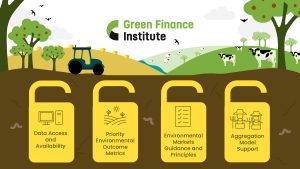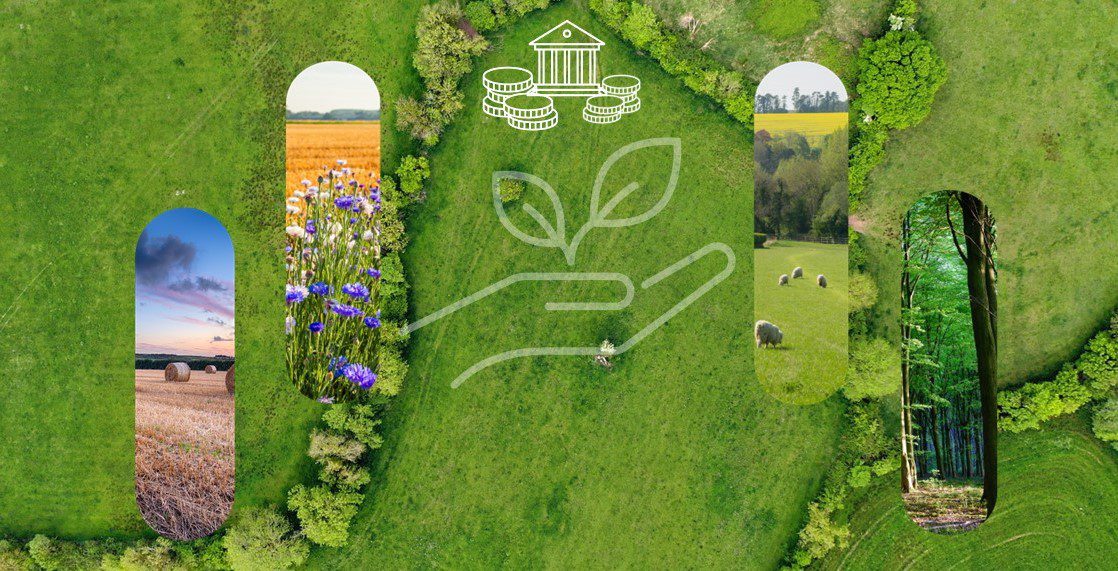“In 2019 the GFI was established to sit at the nexus of the public and private sectors, convening sectoral coalitions to identify and unlock barriers to private sector investment to move capital at the scale and pace needed for the transition. We work across a range of sectors – including nature and biodiversity, where our mission is to increase private sector investment into nature restoration, nature-based solutions, and nature-positive outcomes in and for the UK.
Agriculture plays a key role in net zero and nature-positive ambitions. The agricultural sector currently accounts for an 11% share of greenhouse gas (GHG) emissions in the UK and is projected to rise to 30% by 2030, as other sectors reduce emissions at a faster rate. Furthermore, as stewards of over 70% of the UK’s land, farmers play a direct role in environmental improvements.
In England, the Environmental Land Management schemes will pay farmers to transition to more sustainable means of food production alongside improving nature. However, to deliver a resilient and secure food system – focused on food production and able to deliver the much-needed environmental outcomes – farmers require greater financial support.
To date there has been no estimate on how much a farming transition will cost, but we can be certain that it will be in the billions. A report commissioned by the GFI and produced in partnership with environmental economics consultancy, eftec, in 2021, for example, found a £3.7 billion financing gap for sustainable soils management this decade. Across the UK, there also exists a £19.4 billion gap for protecting and restoring biodiversity.
There are a series of potential private sector sources of finance that can be mobilised for the transition:
- Banks are exploring the potential to provide loans at discounted rates to farmers that meet environmental outcomes, as well as loans to cover costs required for a farming transition. Many are looking to lend to natural capital projects, and some banks are supporting farmers through the supply of measurement and monitoring tools
- Supermarkets, manufacturers and food and beverage companies are looking to support farmers within their supply chains to transition by exploring premium payments through certification, insetting payments and other incentives. They too are paying for, or developing their own, GHG emissions calculators and offering payments for basic baselining
- Buyers of and investors in ecosystem services which stem from improved environmental activities on farms are also seeking to pay farmers for carbon improvements (soil, hedgerows, peatlands and woodland), habitat creation and restoration, nutrient reduction and flood risk reduction
In this context, Defra commissioned the GFI to bring together the farming sector with the above market participants in a Strategic Working Group to identify barriers and collectively recommend solutions to the flow of that capital. Following a six-month consultation with the Working Group and interviews with over 75 experts from across the agricultural sector the GFI published the Financing a Farming Transition report on the 28th March 2023.
The report lays out the barriers preventing private sector finance from moving at scale into the farming transition, including data, confidence and implementation gaps, and identifies four key enablers that will overcome these challenges and create the supporting environment needed to unlock private sector finance and investment for farmers. With each enabler, a roadmap to implementation and key considerations – such as addressing data privacy concerns – are provided.
The key enablers set out in the report are as follows:

Improving data access and availability
Making environmental and spatial data easily accessible through a common platform and language would help farmers, banks and the private sector in integrating natural capital improvements into their businesses and decision-making processes, in addition to the free provision of premium mapping software to farmers.
Setting priority environmental outcomes metrics
The private sector and farming community are seeking a clear vision from government so that they know where to invest their time and resources. A government-defined set of simple, priority environmental outcomes around soil health, water quality and biodiversity for example, complemented by best-practice measurement guidance, would help clarify for farmers and the private sector the environmental data they may want to collect.
Clarity and guidance on high-integrity environmental markets
Greater clarity and formal guidance on the operation of high-integrity environmental markets will provide confidence, such as guidance on insetting, the ability to stack or blend ecosystem services, overarching standards, the inclusion of different forms of tenure in agreements, and tax treatment of ecosystem services.
Aggregation model support
Support including funding, a community of practice and guiding principles will encourage the creation of aggregation models that produce landscape-scale environmental improvements and greater capacity for farmers to attract private finance.
The GFI and many of those that fed into the report are now working together with government to move the recommendations forward.”
CHAP aims to build networks of leading scientists, farmers, advisors, businesses and academia to understand industry priorities and develop innovative solutions. To be our next guest contributor, e-mail enquiries@chap-solutions.co.uk
Please note, the opinions expressed in this article are the author’s own and do not necessarily reflect the views or opinions of CHAP.













